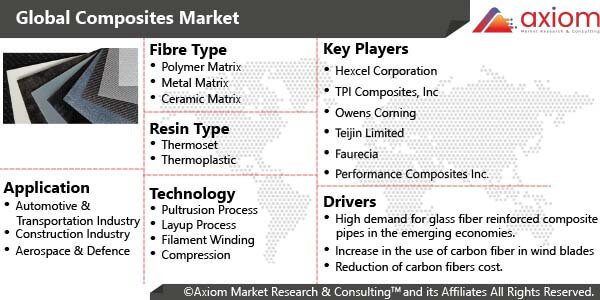Composites are a blend of components. Composites are materials made by consolidating at least two natural or artificial components (with various physical or synthetic properties) that are more grounded as a group than as individual players. The segment materials don't totally mix or lose their individual personalities; they consolidate and contribute their most valuable characteristics to enhance the result or ultimate product. Composites are normally outlined in view of a specific utilize, such as, added quality, productivity or sturdiness.
Composites Market Outlook
Developing interest for lightweight materials for car and air ship segments and raising interest for wind energy is foreseen to drive the global composites market for the following couple of years. With the developing requirement for lightweight and high-quality material in car, aviation, and wind process applications; interest for carbon fiber is always expanding. This is because of the selective properties of carbon fiber, for example, high rigidity, firmness, and temperature resistance and low warm extension and weight. However, the inflated nature of carbon fiber is limiting its utilization in numerous applications. Carbon fiber composites at present cost almost four times the cost of steel. In this way, decreasing the cost of carbon components is probably going to offer lucrative open doors for composite makers. Correspondingly, increased usage of composites in electronic industry, growing use of composites in pipes for water management is also anticipated to drive the global market.
Composites Market Segmental Overview
The global composites market is segmented on the basis of fibre type, resin type, technology, end user and region.
Composites Market by Fibre Type
Fibre type includes polymer matrix composites, metal matrix composites and ceramic matrix composites. Further, polymer matrix composite is sub divided into carbon fiber reinforced plastic and glass fiber reinforced plastic. The glass fibre composites segment is anticipated to steer the composites market as so much as value and volume amid the figure timeframe as fibre composites area unit modest and can be delivered in mass. Fibre composites are being widely used as in the area of aviation and defence, transportation, wind vitality, and construction & infrastructure, applications, that has fuelled the composites market.
Composites Market by Resin Type
This market, by resin type, is further sub-segmented into thermoset composites and thermoplastic composites. Thermoset composites consist of polyester resin, vinyl ester resin, epoxy resin, polyurethane resin and others while, thermoplastic composites include polycarbonates, polyphenyl sulphide, polytherimide, polyetheretherketone and others. Amongst resins, the thermoset composites segment represented for the largest share of the overall industry in the composites market as far as value and also volume in 2017.
Composites Market by Technology
Furthermore, based on technology, the global composites market is categorized into pultrusion process, layup process, filament winding, compression molding, injection molding, resin transfer molding and others. Layup process made high deals in 2017. However, it is foreseen to lose its market share of the overall industry by 2025 by virtue of the developing interest for ease fabricating forms.
Composites Market by Application
By application, the market is made up of automotive & transportation industry, construction industry, aerospace & defence, electrical & electronics and marine, oil & gas. Of these, the automotive and transportation application section held over 25% volume share in the global composites market in 2017. Likewise, the aviation and defence are another application segment which held generally significant share in the global composites market in 2017.
Composites Market by Geography
Geographically, North America dominated the worldwide composites market and held almost 40% volume share in 2017. Asia Pacific is foreseen to witness a rapid growth by volume and prone to remain an appealing business sector for composites. Europe being a noteworthy maker of premium autos, is an alluring market for composites. By virtue of the rising utilization of composites in next-gen aircrafts, the aerospace segment in Europe is anticipated to offer profitable opportunities for the forecast period.
Composites Market Key Players
The key players involved in this market are Hexcel Corporation, TPI Composites, Inc, Owens Corning, Teijin Limited, Faurecia, Performance Composites Inc., Excel Industries Limited, Enduro Composites, Inc., Wethje Carbon Composites, VELLO NORDIC AS, Fiberdur GmbH & Co. KG, Akiet B.V., FILL GESELLSCHAFT M.B.H., Toray Industries, APPLIED POLERAMIC INC., Hexagon Composites, KINECO etc.











